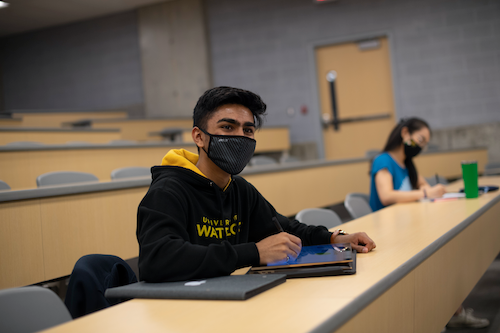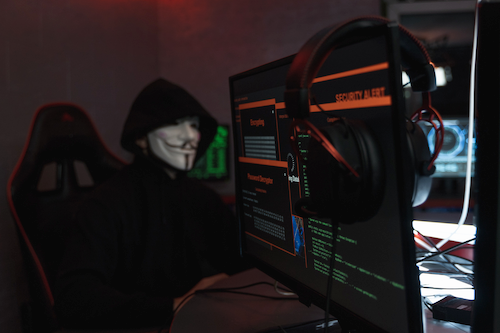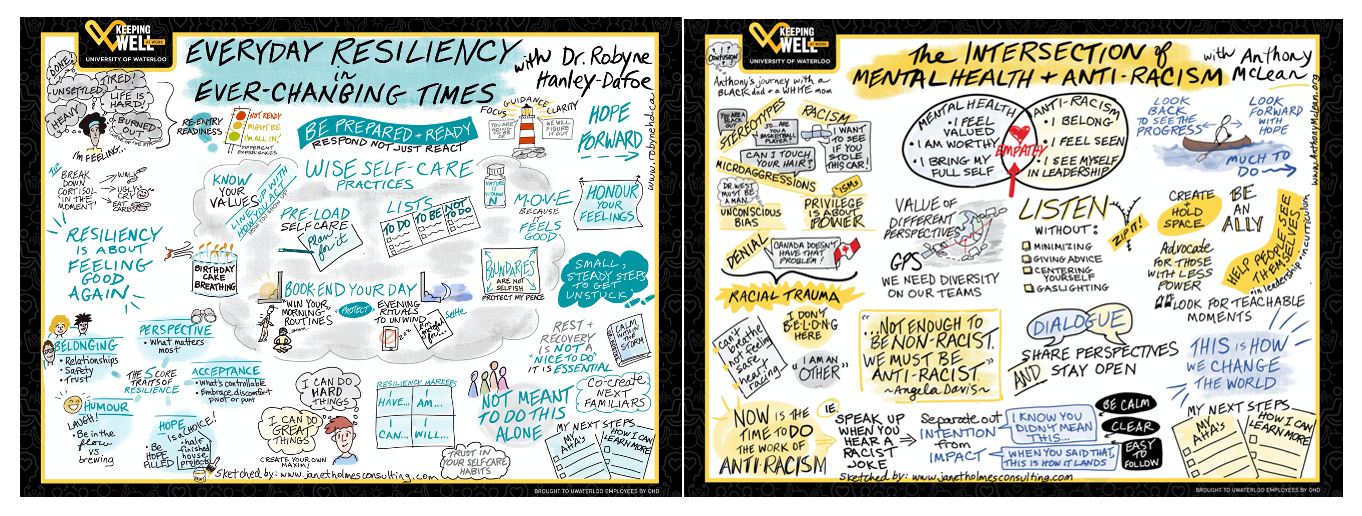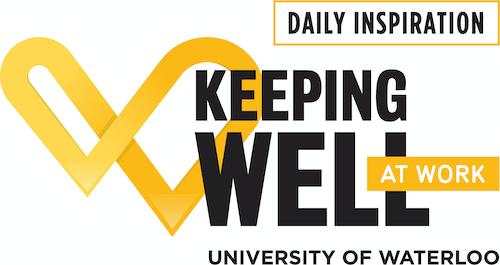- Virtual Open House takes place on Saturday
- GRADFlix has launched for grad students with training on November 1
- Booking a room on campus? There's a new process for that
- Q and A with Maura Grossman: the ethics of artificial intelligence
- Cybersecurity awareness: don't trust, but verify
- Some final thoughts on Keeping Well at Work
Editor:
Brandon Sweet
University Communications
bulletin@uwaterloo.ca
Virtual Open House takes place on Saturday

A message from Marketing and Undergraduate Recruitment.
The Waterloo Virtual Open House (WVOH) will be held on Saturday October 30, from 9 a.m. to 1:30 p.m.
The WVOH will allow prospective students from around the world to learn more about Waterloo’s varied programs and services, and to connect with professors, staff and students who will be on hand during the event.
Attendees will have the chance to sit in on presentations, join a virtual campus tour, ask questions through live chat, watch videos, and download brochures.
If you know a university-bound student, invite them to register.
GRADFlix has launched for grad students with training on November 1

A message from Graduate Studies and Postdoctoral Affairs.
Registration is now open for the 2021-2022 GRADflix competition, a research communication initiative for graduate students.
Participants will create a one-minute video that describes their research to a general audience. A panel of judges selects a shortlist of finalists, whose videos will be showcased in a live virtual event in January, where the winners will be decided. No prior experience with video creation is required.
Any grad student who is interested can attend the GRADflix training session on Nov 1 to learn everything they need to know to create a short, engaging video. Attendance for those who plan to participate is strongly encouraged. Registration is required. Questions about GRADflix can be directed to gradventure@uwaterloo.ca.
Booking a room on campus? There's a new process for that

On March 31, 2021, Donna Schell retired from her position as Bookings Coordinator. Donna managed bookings for over 30 years from her office at Needles Hall, under Dennis Huber, Vice-President, Administration and Finance. In her role, Donna worked with faculty, non-academic departments, and other groups to reserve rooms, lecture halls and on-campus space.
Donna is succeeded by Jamie Doerbecker, who started in the Bookings Coordinator role in October 2021. Jamie comes to the position with extensive knowledge of Waterloo’s campus operations, buildings, and the departments within. As a University of Waterloo student, Jamie held various positions on campus such as the football team’s equipment manager and AHS orientation leader. Jamie graduated from the Recreation and Leisure program in 2014 and since 2016 has worked in Central Stores as a Freight and Mail Delivery Associate.
The Bookings Coordinator position now falls under Materials Resource in Central Stores. The new unit will provide services to secure space for non-course related activities where required, such as:
- Classrooms and lecture halls (both Registrar managed, and other department/faculty managed)
- General use meeting rooms
- Outdoor spaces such as BC Matthews green, Davis Centre quad, Arts quad, Grad House green, and the Modern Languages green
- Seasonal campfire pits at Columbia Lake and across from EV3 (please note: all fire pits are currently closed until the spring).
The Bookings Coordinator can also reserve and arrange delivery of specific meeting and conference furniture/aids. Find the full list of products on the Central Stores website.
To reserve rooms, space, or product (club or society): you will need to fill out some forms through WUSA. Once approved, a contact from WUSA will confirm the booking with the Bookings Coordinator.
For all other bookings: Central Stores is currently working on a bookings form that will include all required information needed to book a room. Until this form is available on the Central Stores website, please email Central Stores Bookings with the details of your request, including the date and time. Bookings will get back to you to confirm availability.
For more information, please contact Jamie Doerbecker by email at cstrbook@uwaterloo.ca or by phone at extension: 42207.
Q and A with Maura Grossman: the ethics of artificial intelligence

By Joe Petrik. This is an excerpt of an article originally published on the Cheriton School of Computer Science website.
Maura R. Grossman, JD, PhD, is a Research Professor in the Cheriton School of Computer Science, an Adjunct Professor at Osgoode Hall Law School, and an affiliate faculty member of the Vector Institute for Artificial Intelligence. She is also Principal at Maura Grossman Law, an eDiscovery law and consulting firm in Buffalo, New York.
Maura is best known for her work on technology-assisted review, a supervised machine learning approach that she and her colleague, Computer Science Professor Gordon V. Cormack, developed to expedite review of documents in high-stakes litigation. She teaches Artificial Intelligence: Law, Ethics, and Policy, a course for graduate computer science students at Waterloo and upper-class law students at Osgoode, as well as the ethics workshop required of all students in the master’s programs in artificial intelligence and data science at Waterloo.
What is AI?
Artificial intelligence is an umbrella term first used at a conference in Dartmouth in 1956. AI means computers doing intelligent things — performing cognitive tasks such as thinking, reasoning, and predicting — that were once thought to be the sole province of humans. It’s not a single technology or function.
Generally, AI involves algorithms, machine learning, and natural language processing. By algorithms we simply mean a set of rules to solve a problem or perform a task.
There are basically two types of AI, though some people believe there are three. The first is narrow or weak AI. This kind of AI does some task at least as well as, if not better than, a human. We have AI technology today that can read an MRI more accurately than a radiologist can. In my field of law, we have technology-assisted review — AI that can find legal evidence more quickly and accurately than a lawyer can. Other examples are programs that play chess or AlphaGo better than top players.
The second type is general or strong AI; this kind of AI would do most if not all things better than a human could. This kind of AI doesn’t yet exist and there’s debate about whether we’ll ever have strong AI. The third type is super intelligent AI, and that’s really more in the realm of science fiction. This type of AI would far outperform anything humans could do across many areas. It’s obviously controversial though some see it as an upcoming existential threat.
Where is AI being used?
AI is used in countless areas.
In healthcare, AI is used to detect tumours in MRI scans, to diagnose illness, and to prescribe treatment. In education, AI can evaluate teacher performance. In transportation, it’s used in autonomous vehicles, drones, and logistics. In banking, it’s determining who gets a mortgage. In finance, it’s used to detect fraud. Law enforcement uses AI for facial recognition. Governments use AI for benefits determination. In law, AI can be used to examine briefs parties have written and look for missing case citations.
AI has become interwoven into the fabric of society and its uses are almost endless.
What is ethical AI?
AI isn’t ethical, just as a screwdriver or a hammer isn’t ethical. AI may be used in ethical or unethical ways. What AI does, however, is raise several ethical issues.
AI systems learn from past data and apply what they have learned to new data. Bias can creep in if the old data that’s used to train the algorithm is not representative or has systemic bias. If you’re creating a skin cancer detection algorithm and most of the training data was collected from White males, it’s not going to be a good predictor of skin cancer in Black females. Biased data leads to biased predictions.
How features get weighted in algorithms can also create bias. And how the developer who creates the algorithm sees the world and what that person thinks is important — what features to include, what features to exclude — can bring in bias. How the output of an algorithm is interpreted can also be biased.
How has AI been regulated, if at all?
Most regulation so far has been through “soft law” — ethical guidelines, principles, and voluntary standards. There are thousands of soft laws and some have been drafted by corporations, industry groups, and professional associations. Generally, there’s a fair degree of consensus as to what would be considered proper or acceptable use of AI — for example, AI shouldn’t be used in harmful ways to perpetuate bias, AI should have some degree of transparency and explainability, it should be valid and reliable for its intended purpose.
The most comprehensive effort to date to generate a law to govern AI was proposed in April 2021 by the European Union. This draft EU legislation is the first comprehensive AI regulation. It classifies AI into risk categories. Some uses of AI are considered unacceptably high risk and they tend to be things like using AI to manipulate people psychologically. Another prohibited use is AI to determine social scores, where a person is monitored and gets points for doing something desirable and loses points if doing something undesirable. A third prohibited use is real-time biometric surveillance.
The next category are high-risk AI tools like those used in medicine and self-driving vehicles. A company must meet all sorts of requirements, conduct risk assessments, keep records, and so on before such AI can be used. Then there are low-risk uses, such as web chatbots that answer questions. Such AI requires transparency and disclosure, but not much else.
Can AI conform to human values or social expectations?
It’s very difficult to train an algorithm to be fair if you and I cannot agree on a definition of fairness. You may think that fairness means the algorithm should treat everyone equally. I might believe that fairness means achieving equity or making up for past inequities.
Our human values, cultural backgrounds, and social expectations often differ, leaving it difficult to determine what an algorithm should optimize. We simply don’t have consensus yet.
In machine learning, we often don’t know what the system is doing to make decisions. Are transparency and explainability in AI important?
That’s a difficult question to answer. There is definitely something to be said for transparency and explainability, but in many circumstances it may be good enough if the AI has been tested sufficiently to show that it works for its intended purpose. If a doctor prescribes a drug, the biochemical mechanism of action may be unknown, but if the medication has been proven in clinical trials to be safe and effective, that may be enough.
Another way to look at this is, if we choose to use less sophisticated AI that we can more easily explain, but it is not as accurate or reliable than a more opaque algorithm, would that be an acceptable tradeoff? How much accuracy are we willing to give up in order to have more transparency and explainability?
It may depend on what the algorithm is being used for. If it’s being used to sentence people, perhaps explainable AI matters more. In other areas, perhaps accuracy is the more important criterion. It comes down to a value judgment.
Interested in learning more about ethical AI? Read the full article on the Cheriton School of Computer Science website.
Cybersecurity awareness: don't trust, but verify

A message from Information Systems & Technology (IST). October is Cybersecurity Awareness Month, and the UW Information Security Services team will be bringing you some simple hints to allow you to be cyber secure.
If you receive an email message requesting you to submit financial, login, or any other sensitive personal information with a link to do so, don’t click. Contact the individual or organization by other means, not using the contact information contained in the email, to verify the request. You can also visit the organization’s website and log into your account to see if you have any messages.
Some final thoughts on Keeping Well at Work

A message from Organizational and Human Development (OHD).
It’s been a meaningful month focused on learning and practicing strategies to keep well at work. “I’m encouraged to see so many real examples this past month of how Waterloo employees are actively pursuing their well-being in our work context," says Melanie Will, Director of OHD. "We hope to continue to see folks adding daily wellness practices into their work calendars to give space and time for important self-care.”
If you missed the conference but are interested in a run-down of learning takeaways, OHD has you covered: Keep Your Mental Health Thriving: A look back at Keeping Well at Work 2021.
You can also access the KW@W 2021 conference presentations, recordings and resources (like these digital sketches of our Keynote talks) to catch up on what you missed or take your learning further by logging into the OHD Resources website.

Interested in more ways to jumpstart your journey to taking care of your mental health? Register for COVID-19 Self-Care Strategies to gain valuable ideas on how to preserve your well-being through self-care tips and Managing Your Time and Energy, which will cover the most efficient ways of managing your time and energy to have successful outcomes at work.

The final KW@W Daily Inspiration for 2021 reminds us that Laughter is the secret ingredient to wellness. There's no denying that having and sharing a good laugh is transformative. Laughter is scientifically proven to have countless health benefits. Don't miss the opportunity to laugh or spark laughter: share a funny video, a giggle-worthy moment in your day or jovial GIF with someone who needs a laugh today.
(Funny and poignant: Watch Keynote Anthony McLean’s talk on the Intersection of Mental Health and Anti-Racism. Available only until November 12. Login required.)
Upcoming office closure
The Writing and Communication Centre (WCC) will be closed today for professional development. All WCC programs will be resuming the following business day.
No podcast this week

The Beyond the Bulletin Podcast is taking a break this week. Why not catch up on episodes you may have missed in our archive? The podcast will return on Friday, November 5.
Link of the day
In the spirit of Hallowe'en: When the Darkness Presses
When and Where to get support
Students can visit the Student Success Office online for supports including academic development, international student resources, immigration consulting, leadership development, exchange and study abroad, and opportunities to get involved.
Instructors looking for targeted support for developing online components for blended learning courses, transitioning remote to fully online courses, revising current online courses, and more please visit Agile Development | Centre for Extended Learning | University of Waterloo (uwaterloo.ca).
Instructors can visit the Keep Learning website to get support on adapting their teaching and learning plans for an online environment.
Course templates are available within your course in LEARN to help you build and edit your content and assignment pages quickly.
The following workshops, webinars, and events are offered by the KL team (CTE, CEL, ITMS, LIB):
- Independent Remote Course Design Essentials, self-directed, continuous self-enrollment course in LEARN.
- Independent Blended Course Design (iBlend), self-directed, ongoing
- Copyright Overview for Waterloo Instructors and Staff - self-directed, continuous self-enrollment course in LEARN.
-
Thirty Minute Thursdays– PebblePad – Offered:November 11, November 18, November 25, 12:00 noon to 12: 30 p.m.
-
Online Instructional Skills Workshop (ISW) (CTE8601), begins on October 22, 8:00 a.m.
-
Getting Ready to Facilitate Online Courses: TA Training, beginning November 1.
Employees can access resources to help them work remotely, including managing University records and privacy of personal information. Here are some tips for staying healthy while working from home.
Stay informed about COVID cases on campus by consulting the COVID case tracker.
The Writing and Communication Centre has virtual services and programs to help undergrads, grad students, postdocs and faculty members with academic writing.
- Meet with writing advisors in one-to-one appointments to brainstorm, draft, revise, and polish. No time for an appointment? Try email tutoring for undergrads.
- Beat isolation and make writing progress at weekly Virtual Writing Cafés for grad students and faculty or PJ-Friendly Writing Groups for Undergrads.
- Take an online workshop or apply to our popular Dissertation Boot Camp program.
- Faculty can request custom in-class workshops for their courses, or the WCC can facilitate any existing workshops for student groups.
Co-op students can get help finding a job and find supports to successfully work remotely, develop new skills, access wellness and career information, and contact a co-op or career advisor.
The Centre for Career Action (CCA) is offering some in-person services for fall 2021. The Tatham Centre is open with front-desk support, limited in-person appointments and co-op consults. Services are also available virtually. Book an appointment online or Live Chat with our Client Support Team. The CCA is here to help.
If you feel overwhelmed or anxious and need to talk to somebody, please contact the University’s Campus Wellness services, either Health Services or Counselling Services. You can also contact the University's Centre for Mental Health Research and Treatment. Good2Talk is a post-secondary student helpline available to all students.
While the Library continues to focus on digital resources and consultations, our spaces are open for the fall term. Dana Porter Library is open Monday to Friday, 9 a.m. to 5 p.m., and Davis Centre Library is open Monday to Friday, 9 a.m. to 11 p.m., and Saturday and Sunday, 11 a.m. to 5 p.m. for drop-in individual study space, bookable individual study rooms, drop-in access to computers and printers, book pick-up services and IST Help Desk support. Special Collections & Archives and the Geospatial Centre will be accessible by appointment. Library staff are available for questions via Ask us. Full details on current services and hours are available on the Library’s COVID-19 Update webpage.
The Faculty Association of the University of Waterloo (FAUW) continues to advocate for its members. Check out the FAUW blog for more information.
The University of Waterloo Staff Association (UWSA) continues to advocate for its members. Check out the UWSA blog for more information.
The Sexual Violence Prevention and Response Office (SVPRO) supports all members of the University of Waterloo campus community who have experienced, or been impacted, by sexual violence. This includes all students, staff, faculty and visitors on the main campus, the satellite campuses, and at the affiliated and federated Waterloo Institutes and Colleges. For support, email: svpro@uwaterloo.ca or visit the SVPRO website.
The Office of Indigenous Relations is a central hub that provides guidance, support, and resources to all Indigenous and non-Indigenous campus community members and oversees the University's Indigenization strategy.
The Waterloo Indigenous Student Centre, based at St. Paul’s University College, provides support and resources for Indigenous students, and educational outreach programs for the broader community, including lectures, and events.
WUSA supports for students:
Peer support - MATES, Glow Centre, RAISE, Women’s Centre - Visit https://wusa.ca/peersupport to book an appointment either in person or online for the Fall term!
Food Support Service food hampers are currently available from the Turnkey Desk 24/7 in the Student Life Centre. Drop off locations are also open again in SLC, DC, DP, SCH and all residences.
Co-op Connection all available online. Check https://wusa.ca for more details.
Centre for Academic Policy Support - CAPS is here to assist Waterloo undergraduates throughout their experience in navigating academic policy in the instances of filing petitions, grievances and appeals. Please contact them at caps@wusa.ca. More information is available.
WUSA Student Legal Protection Program- Seeking legal counsel can be intimidating, especially if it’s your first time facing a legal issue. The legal assistance helpline provides quick access to legal advice in any area of law, including criminal. Just call 1-833-202-4571.
Empower Me is a confidential mental health and wellness service that connects students with qualified counsellors 24/7. They can be reached at 1-833-628-5589.
When and Where (but mostly when)
Healthy Warriors at Home (Online Fitness)
Warriors vs. Laurier Blood Donation Battle. Join your fellow Warriors, donate blood and help us win the Blood Battle against Laurier for a second year in a row. Set up a profile or add the PFL code: UNIV960995 to your account if you have a blood.ca account already. Questions? Contact WarriorsInfo@uwaterloo.ca.
Drop-in to Warrior Virtual Study Halls on Wednesdays from 5:30 p.m. to 7:00 p.m. Come together in this virtual space to set goals and work independently or in groups each week.
Renison English Language Institute continues to offer virtual events and workshops to help students practice their English language skills.
University Relations Silent Auction for the United Way, Monday, October 25, 8:30 a.m. to Friday, October 29, 12 noon.
IT Seminar: Zoom for Campus, Friday October 29, 9:00 a.m. to 9:45 a.m. Join online.
NEW - Science Scavenger Hunt for Kids, runs daily until Sunday, October 31, 5:00 p.m., Waterloo Park. Get outside for some scientific discovery: the Science Outreach team created a fun science-themed scavenger hunt in Waterloo Park, ideal for elementary-school-aged kids. Can you complete all eleven missions?
Knowledge Integration seminar: “Convergence Science Teams”, featuring speaker Dr. Maritza Salazar Campo, assistant professor at The Paul Merage School of Business, University of California Irvine, Friday, October 29, 1:00 p.m.
Warriors Football vs. Laurier, Saturday, October 30, 1:00 p.m. Purchase tickets or watch online at OUA.TV.
IQC presents Chanda Prescod-Weinstein, “The Disordered Cosmos: A Journey into Dark Matter, Spacetime, & Dreams Deferred,” Monday, November 1, virtual talk, details and a link to the virtual talk will be sent to those who register.
Faculty of Mathematics presents: Graduate Studies Information Day, Tuesday, November 2, 2021. Register today for one of our virtual sessions.
THRIVE: Dance It Out, Wednesday, November 3, 1:00 p.m. (PAC Studio 1). Free for students, staff and faculty. Register now.
NEW - Cheriton School of Computer Science Distinguished Lecture Series, Active Inference, featuring Karl J. Friston, Wellcome Principal Research Fellow and Scientific Director, Wellcome Trust Centre for Neuroimaging, Institute of Neurology, University College London, Thursday, November 4, 11:00 a.m. via Zoom.
PhD oral defences
Kinesiology and Health Sciences. Isabel Rodrigues, "Bridging the gap between physical activity evidence and practice for older adults with osteoporosis or frailty." Supervisor, Lora Giangregorio. Email Health Graduate Administration at ahs.graduate.administration@uwaterloo.ca for a copy. Oral defence Monday, November 1, 10:00 a.m.
Physics & Astronomy. Tomáš Gonda, “Resource Theories as Quantale Modules.” Supervisors, Robert Spekkens and Florian Girelli. This thesis has been deposited in the Faculty of Science Graduate Office, PHY 2013, and is available for perusal until Tuesday, October 26. Please visit our Thesis Submission Notices for details on requesting a copy. Oral defence Tuesday, November 2, 9:00 a.m.
Combinatorics and Optimization. Jimit Majmudar, "Recovery Guarantees for Graph Clustering Problems." Supervisor, Stephen Vavasis. Thesis available from MGO - mgo@uwaterloo.ca. Oral defence Tuesday, November 2, 9:30 a.m.
History. Cameron Winter, "Three Years and Two Continents Apart: A Comparative Study of the Great Sioux War and Anglo-Zulu War." Supervisor, Dan Gorman. Available upon request from the Faculty of Arts, Graduate Studies and Research Officer. Oral defence Tuesday, November 2, 9:30 a.m.
Statistics and Actuarial Science. Zehao Xu, "Interactive and Static Statistical Graphics: Bridge to Integration." Supervisor, Richmond Wayne Oldford. Thesis available from MGO - mgo@uwaterloo.ca. Oral defence Monday, November 8, 5:00 p.m.
Kinesiology & Health Sciences. Daniel Viggiani, "The Prediction of Nociceptive Neural Activity in Passive Tissues Following Lumbar Spine Flexion." Supervisor, Jack Callaghan. Email Health Graduate Administration at ahs.graduate.administration@uwaterloo.ca for a copy. Oral defence Tuesday, November 9, 1:00 p.m.